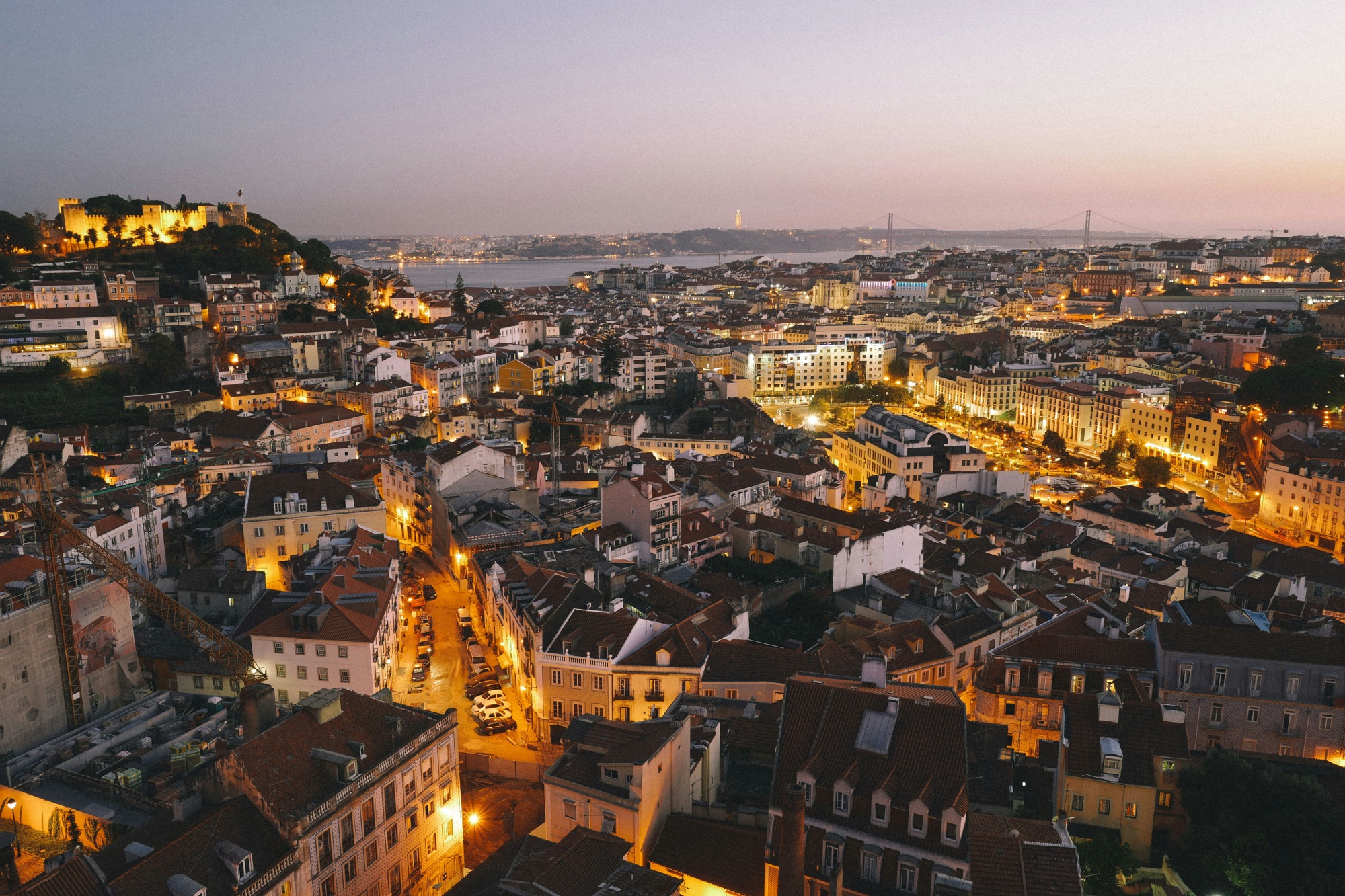Portugal is one of Europe’s most beautiful and culturally rich countries, offering everything from historic cities and stunning coastlines to world-renowned cuisine and warm, welcoming locals. Whether you’re planning to explore the vibrant city of Lisbon, relax on the beaches of the Algarve, or wander through the vineyards of the Douro Valley, there are a few important things to know before you go. Here are 18 things Americans should know before traveling to Portugal.
1. Portugal Is Extremely Walkable, but Expect Hills
Portugal’s cities and towns are known for being walkable, but the terrain can be challenging, especially in places like Lisbon and Porto, which are built on steep hills. Lisbon, in particular, is famous for its many miradouros (viewpoints), and getting around often means walking up or down steep cobblestone streets.
Comfortable shoes with good grip are essential, especially since many streets are paved with calçada portuguesa (traditional Portuguese stone mosaics), which can be slippery when wet. Walking is one of the best ways to explore Portugal, but be prepared for some uphill climbs.
2. Public Transportation Is Efficient and Affordable
Portugal boasts a well-developed and affordable public transportation system, especially in cities like Lisbon and Porto. Trams, buses, subways, and trains make it easy to get around both urban and rural areas. Lisbon’s famous yellow trams, particularly Tram 28, are a popular way to explore the city’s historical districts, while Porto has an extensive metro network.
Long-distance trains and buses are also efficient and a great way to travel between cities. If you plan to use public transportation frequently, consider purchasing a transportation card, such as the Lisboa Card, which provides unlimited access to public transport and discounts on attractions.
3. Tipping Is Appreciated but Not Required
Unlike in the U.S., tipping is not mandatory in Portugal, but it is always appreciated for good service. In restaurants, it’s common to round up the bill or leave a small tip, typically 5-10%. For smaller services like taxis or cafes, leaving a few coins is sufficient.
If you receive exceptional service, feel free to leave a bit more, but don’t feel obligated to tip as generously as you might in the U.S. The service charge is usually included in the bill at upscale restaurants, so always check before tipping.
4. Portugal Has Amazing Regional Cuisine
Portugal’s cuisine is incredibly diverse, and it changes dramatically from one region to another. Seafood is a staple, especially in coastal areas, with dishes like bacalhau (salted cod), sardines, and octopus being national favorites. The central and northern regions offer hearty dishes like cozido à portuguesa (a meat and vegetable stew) and caldo verde (a potato and kale soup).
Each region also has its own specialty desserts, with Lisbon known for pastéis de nata (custard tarts) and the Alentejo region famous for its encharcada (an egg yolk-based dessert). Be sure to explore each region’s local dishes to experience the full spectrum of Portuguese flavors.
5. Wine Is a Big Deal in Portugal
Portugal is a wine lover’s paradise, with a long history of winemaking and some of the best wines in the world. Port wine, which originates from the Douro Valley in northern Portugal, is one of the country’s most famous exports, but there are many other wines worth trying, including Vinho Verde (a light, slightly sparkling wine) and Dão wines from central Portugal.
Wine is typically inexpensive, even in restaurants, and pairing it with a meal is common. If you’re a wine enthusiast, consider visiting some of the many vineyards and wineries across the country, particularly in the Douro Valley, where you can enjoy tastings and learn more about the local production.
6. Portuguese People Are Friendly but Reserved
While Portuguese people are known for their hospitality, they can also be somewhat reserved, especially at first. Don’t mistake this for unfriendliness—it’s just part of the local culture. Once you engage with locals, you’ll find them to be warm, helpful, and eager to share their country’s beauty and history.
If you’re polite and respectful, Portuguese people will often go out of their way to assist you. Basic greetings like “Bom dia” (Good morning) or “Obrigado/a” (Thank you) can go a long way in building rapport with locals.
7. Safety and Low Crime Rates
Portugal is considered one of the safest countries in Europe, with low crime rates, particularly in terms of violent crime. Petty theft, such as pickpocketing, can occur in crowded tourist areas or on public transportation, but overall, the country is very safe for travelers. As always, it’s wise to be mindful of your belongings, especially in busy areas, but you can generally feel safe walking around Portugal’s cities and towns, even at night.
8. Driving Can Be Challenging in Some Areas
If you plan to rent a car to explore more remote areas or the countryside, be prepared for some narrow, winding roads, especially in historic towns and rural areas. In cities, parking can be difficult to find, and many streets are one-way or have restricted access to certain types of vehicles.
In the Algarve and other rural areas, driving is a great way to see hidden beaches and off-the-beaten-path locations, but in cities like Lisbon or Porto, public transportation is usually the better option. Also, be mindful that tolls are common on major highways, and it’s a good idea to rent a car equipped with an electronic toll device to make traveling easier.
9. Portugal Has Some of Europe’s Best Surfing Spots
For those who love water sports, Portugal is a surfing paradise, with some of Europe’s best surfing beaches. Nazaré is world-famous for its gigantic waves, which attract top surfers from around the globe. Peniche and Ericeira are also renowned surf spots, offering both beginner-friendly waves and challenging breaks.
Surfing culture is deeply ingrained in coastal Portugal, and many beach towns offer surfing lessons and equipment rentals. Whether you’re an experienced surfer or a beginner looking to try something new, Portugal’s surf scene is worth exploring.
10. Portugal’s Beaches Are Stunning but Can Be Windy
Portugal’s coastline stretches for hundreds of miles and is dotted with some of the most beautiful beaches in Europe. The Algarve region, in particular, is famous for its golden sands, dramatic cliffs, and crystal-clear waters. However, keep in mind that some of Portugal’s beaches, especially along the Atlantic coast, can be quite windy and the waters cooler than you might expect, even in summer.
For those looking for calm waters and warmer temperatures, the beaches in the southern Algarve or near Lisbon, such as Cascais, are ideal. Always check local weather conditions if you’re planning a day at the beach, as winds can affect your experience.
11. You Can Drink the Tap Water
The tap water in Portugal is safe to drink, and it’s common for locals to drink it without issue. In restaurants, however, you’ll often be offered bottled water, and many tourists opt for this. If you prefer to drink tap water, you can simply ask for “água da torneira” (tap water), and in most cases, it will be provided without charge.
12. Don’t Rush Your Meals
Meals in Portugal are meant to be leisurely, and locals often spend hours enjoying their food and conversation. Lunch and dinner are typically multi-course affairs, especially at traditional restaurants. Don’t expect fast service—Portuguese dining is more about the experience than efficiency, so take your time and savor each course.
Even in cafes, it’s normal to linger over a coffee or a glass of wine, so don’t feel rushed to leave once you’ve finished your meal.
13. Portuguese Coffee Culture Is Strong
Like many southern European countries, Portugal has a strong coffee culture. Coffee is typically served in small cups, and espresso is the most common order. A bica (espresso) or a meia de leite (similar to a latte) are popular choices, and coffee is often enjoyed standing at the counter in local cafes.
Cafes are a central part of Portuguese daily life, and you’ll find them on nearly every street corner. Whether you’re stopping for a quick shot of espresso or sitting down with a pastel de nata, don’t miss the chance to experience Portugal’s cafe culture.
14. The Fado Tradition
Fado is a traditional form of Portuguese music that originated in Lisbon and Coimbra. It’s a soulful and melancholic genre, often described as the musical expression of saudade (a feeling of longing or nostalgia). Fado performances are a must-see for anyone interested in Portuguese culture, and you can find many venues, especially in Alfama and Bairro Alto, where Fado is performed live.
It’s customary to remain quiet and attentive during a Fado performance, as it’s a deeply emotional art form that is highly respected in Portugal.
15. Portugal Is LGBTQ+ Friendly
Portugal is considered one of the most LGBTQ+ friendly countries in the world. Same-sex marriage has been legal since 2010, and the country has strong anti-discrimination laws in place. Cities like Lisbon and Porto have thriving LGBTQ+ scenes with numerous bars, clubs, and events catering to the community.
While Portugal is generally open and accepting, smaller towns and rural areas may be more conservative, so travelers should be mindful of local attitudes depending on the region.
16. Electric Outlets Use Type C and F Plugs
If you’re traveling to Portugal from the U.S., you’ll need to bring a plug adapter for your electronics, as Portugal uses Type C and Type F outlets. The voltage is 230V, so make sure your devices are compatible with this voltage or bring a voltage converter if needed.
Most modern electronics like smartphones, laptops, and cameras are dual voltage and only require a plug adapter, but it’s best to check your devices before traveling.
17. There Are Two Main Regions to Explore
While most travelers flock to Lisbon and the Algarve, Portugal has many other regions worth exploring. The north of Portugal, especially the Douro Valley and Porto, is known for its wine production, beautiful landscapes, and historic architecture. Coimbra, a university town, and Aveiro, often referred to as the “Venice of Portugal,” are also gems to explore.
In the south, beyond the Algarve, you’ll find the Alentejo, a region of rolling plains, vineyards, and charming medieval towns. Each region offers something unique, and exploring beyond the main tourist hubs will give you a deeper understanding of Portugal’s diversity.
18. Respect Local Customs and Traditions
While Portugal is a modern and open country, it’s important to be respectful of local customs and traditions. The Portuguese are generally polite and reserved, and it’s appreciated if you greet people with a friendly “Bom dia” when entering shops or restaurants. Showing respect for local traditions, such as observing religious holidays or participating in local festivals, is a great way to immerse yourself in Portuguese culture.
Conclusion
Portugal is a diverse and fascinating country that offers an array of experiences for travelers, from its historic cities and beautiful coastlines to its rich food and wine culture. By understanding local customs, exploring beyond the typical tourist spots, and savoring the slow pace of Portuguese life, you’ll be able to fully appreciate the beauty and warmth of this wonderful country. Whether you’re sipping coffee in a Lisbon cafe or hiking along the cliffs of the Algarve, Portugal promises an unforgettable journey.




